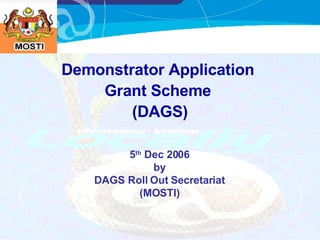Demonstrator Application Grant Scheme, Malaysia
- 1. Demonstrator Application Grant Scheme (DAGS) 5 th Dec 2006 by DAGS Roll Out Secretariat (MOSTI)
- 2. Outline Background DAGS - Focus, Goals and Selection Criteria - Disbursement Principles - Status ŌĆō List of Projects and Target Groups Achievements Lessons Learned Way Forward
- 3. Background Mooted by NITC in 1998 with initial RM50 million allocation (RMK-7); Entrusted with additional RM100 million (RMK-8); Key initiative program to realise National IT AgendaŌĆÖs objectives. DAs ŌĆō focus projects using ICT applications that creates value to community development Pilot project/model (small, focused and quick realisation)with the intent of replication, up-scaling or commercialisation as well as sustainability
- 4. NITA: The Digital Bridge to the people PEOPLE comprehensive human development INFOSTRUCTURE Info. Age development foundation CONTENT & APPLICATIONS Solutions for Info. Age work and life ACCESS AND EQUITY QUALITATIVE TRANSFORMATION CREATING VALUE E-MALAYSIA: Values-based Knowledge Society by 2020 Connectivity Equitable access to info Culture of learning Info literacy Sustainable societal innovation for better Quality of Life Innovation systems, creativity, entrepreneurship through R&D Life long learning
- 5. DAGS Goals In realisation of national vision of achieving a values-based knowledge society by 2020: ICT Diffusion and Acculturation Enhancing quality of life through ŌĆ£Digital InclusionŌĆØ, meaningful participation and knowledge utilization for value creation
- 6. Why DAGS? To prompt Malaysians into owning and implementing the NITA at all levels and across all sectors To create a learning platform for Malaysians to experiment the benefits of ICT To demonstrate working and successful models of how ICT can improve quality of life To nurture and generate the growth of bottom-up ICT initiatives nationwide especially outside the MSC To engage the public, private and non-governmental/non-profit sectors in forming mutually beneficial partnerships at the federal, state and local level. To provide opportunities for all Malaysians to participate in national ICT development
- 7. DAGS Focus DAGS stresses on: Tri-sectoral partnership Community development through ICT Clarity in goals and deliverables Innovation Relationship building Sustainable development Quick realization (short term / 1 year) DAGS mechanism enables the creation of shared vision and team spirit among the stake holders (public, private and community) which ensure sustainable ICT projects that bring increasing returns to the community
- 8. DAGS Selection Criteria Clear and identifiable target communities. Clear value proposition of the project to the target communities Clear role of the technology in delivering the benefits to the communities. Clear role of partners in implementing the project. Clear justification on the need of DAGS funding. Clear Project Management Methodology
- 9. Maximum 70% of total project cost Based on performance and evaluation milestones Funding only for related project costs Quarterly disbursements project progress report certified statement of accounts Grant applicant co-invest in form of cash, personnel or equipment or combination of these Grant Support & Disbursement Guidelines
- 10. DAGS Application Process Flow Agreement Applicant Secretariat Executive Summary Proposal Expert DEDC MOSTI Resubmit/ Reject Recommend No No Recommend Resubmit/ Reject Approved No Recommend Rejected Recommend No No
- 11. Current Status 109.57mil 80.17mil 29.42mil Total amount approved by MOSTI (RM) 78 52 26 Total project approved by MOSTI 120mil 90mil 30mil Allocation (RM) TOTAL 8MP 7MP Description
- 12. List of DAGS projects according to BDD target groups Senior Citizens Disabled SMEs Youth Poor Women Rural Indigenous Eagle Nest Warga Emas Network Pesarajaya PDKNet E-Pekak GROW Portal MyBiz Tradenex.com Smart Taxipreneur E-Bario E-WargaKota E-Upcom T-Center E-Homemakers E-Keluarga Juvanet e-RHAM Digital Sports Network Cyber Plant Conservation e-Nature Education e-Integrasi
- 13. Achievements / Awards Received e-Bario Won the Anugerah Perdana Teknologi Maklumat (2003) Special presentation on e-Bario at 2003 World Summit on Information Society (WSIS) by Strategy and Policy Unit of ITU (ITU-SPU) Industry Innovators Award for Systems Development & Applications by Society of Satellite Professionals International, on March 6th, 2002, Washington DC Bario, named as one of the Top Seven Intelligent Communities 2001 by World Teleport Association, Washington DC
- 14. Achievements / Awards Received (cont.) MyBiz Global Knowledge Partnership (Best Practice for online business community) Stockholm Challenge Finalist JuvaNet Second runner-up of Anugerah Inovasi (Government category) for Bulan IT Selangor 2003.
- 15. Achievements / Awards Received (cont.) e-Homemakers Candidate for UN Malaysia Award 2001 WENT (Women's Electronic Network Training) Award 2003 Runner-up┬Āin the Gender and ICT Award 2005 e-RHAM For Youth Project: Providing Sexual and Reproductive Health Knowledge and Responsible Living Skills to Adolescents UNESCOŌĆÖs Adolescence Education Newsletter, December 2003 release
- 16. Achievements / Awards Received (cont.) T-Center For Teleworking And Telecommuting Dewan Bandaraya Kuala Lumpur (DBKL) has recognized the project as a viable community development project The Ministry of Women and Family Development has given its consent to start another such project for women in Bangsar Utama, Kuala Lumpur The Ministry of Housing and Local Government invited the project promoters for a presentation on the teleworking project at PPR Desa Tun Razak, Cheras
- 17. Identifying project that is unique, have value and beneficial to community To reduce the understanding gap on unique definition, discussion and on-going communication with applicants were maintained Smart partnership Instill the importance of involvement of all partners from early stage and during project implementation Project sustainability and commercialization Stress on the importance of business plan or sustainability plan after one year of DAGS grant period Lesson Learned
- 18. Next Steps 9MP RM 100mil allocated for roll out / implementation for successful and viable projects Survey was sent to 76 projects, 40 projects response 70% allocation for Roll Out 30% allocation for new projects
- 19. DAGS Roll Out Secretariat ICT Policy Division MOSTI URL: www.dags.net.my Thank You



















